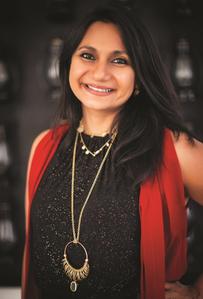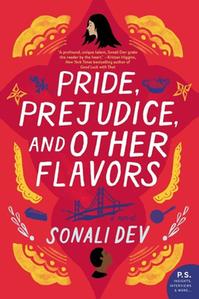 The author of A Change of Heart and A Bollywood Affair, Sonali Dev fully uses her experiences of life in both India and the U.S. in her new novel, Pride, Prejudice and Other Flavors (out now from Morrow, reviewed below). She has won the American Library Association's award for best romance, the RT Reviewer Choice Award for best contemporary romance, multiple RT Seals of Excellence and is a RITA finalist. Dev lives near Chicago with her family.
The author of A Change of Heart and A Bollywood Affair, Sonali Dev fully uses her experiences of life in both India and the U.S. in her new novel, Pride, Prejudice and Other Flavors (out now from Morrow, reviewed below). She has won the American Library Association's award for best romance, the RT Reviewer Choice Award for best contemporary romance, multiple RT Seals of Excellence and is a RITA finalist. Dev lives near Chicago with her family.
Did you purposely choose the characters' careers and background to illustrate the elements that drive the story's connection to Jane Austen's Pride and Prejudice?
The seed of this novel was the gender flip. I had always wanted to retell Pride and Prejudice (what can I say, I'm a cliché). However, having grown up in India at a time when getting daughters married off still seemed like the primary focus of society, I was weary of that angle. So I knew it would never be a retelling that focused on marriage as the vehicle to break class ranks but that focused on power imbalances and navigating those in more personally relevant ways. And given how much we love Mr. Darcy for all his prickliness and how easily we forgive him when he decides to be a decent human being, I wanted to examine how that would work if Mr. Darcy were a woman, with all that pride, privilege and sense of entitlement--and, of course, nobility of intent.
That's where Trisha's career and background come from. With DJ, I wanted to explore the part of Lizzie Bennet's personality where she has every extrinsic reason to not love herself and to not have the courage of her convictions, and yet she believes herself worthy of things society tells her she doesn't deserve. It's a match made in story-heaven: two people who take being right so seriously and yet are so very wrong about each other.
I also wanted to dig into first impressions--how people judge you before they even know you. Culturally, both DJ and Trisha are constantly judged as being something completely different from who they are.
Did you draw from personal experience with your own family in the interactions of Trisha's large family?
Absolutely. My extended family is extremely close. Everyone is very much in one another's business, and expectations and rules are complicated and unspoken. On the other hand, it's a family that is focused on being progressive and on social change. My great grandfather spent his life knocking on people's doors and trying to get them to send their daughters to the school he built for girls, one of the first in colonized India. This was at the turn of the last century. People threw stones at him, literally and figuratively. My grandmother went to medical school in the 1930s; my other grandmother read Jane Eyre to me in elementary school and gave me my first glimpse of what a "book boyfriend" is. I grew up without most taboos of my time, being able to discuss anything and everything with my parents and grandparents. The notion that society is unchangeable was something I just never internalized. I feel like a lot of that leaks into how the Rajes live. This, of course, comes with a huge sense of responsibility toward your family and your world.
 The Bay Area setting underlines the obvious contrast between the privileged lifestyle of the heroine and the hero's less affluent life. Could the story have been set as effectively elsewhere, in Los Angeles, for example, or New York?
The Bay Area setting underlines the obvious contrast between the privileged lifestyle of the heroine and the hero's less affluent life. Could the story have been set as effectively elsewhere, in Los Angeles, for example, or New York?
A large part of our immigrant family lives in the Bay Area, so we spend a lot of time there and it feels very familiar to me personally. It was an absolutely deliberate choice to set the story there. One of the central themes of the book is finding the meaning of home. I needed a place where the immigrant experience (specifically the Indian American experience) isn't entirely isolating. Indian Americans are just about 1% of the U.S. population, and in most parts of the country, growing up Indian American can come with being treated like an other in your own home. In parts of the Bay Area, because of the large Indian population that has settled there, that cultural foreignness isn't as palpable.
It's also a place that takes knowledge and education very seriously. The Raje children have been raised to own their Americanness and assimilate, but living in that part of California has made it feasible in a way that's unique to the place, and that has impacted their personalities and how they interact with their world. They feel an ownership of their home because their environment doesn't push back like it can in other parts of the country.
Your novel tackles big subjects--prejudice, racism, economic divides--on a very personal level for your characters. Did you intentionally set out to bring readers intimate examples of coping with deep cultural issues?
It is always my intention to bring my readers as close to my characters' experiences as I can. And, of course, I want those experiences to be meaningful and relevant to what I want to say with my story. I believe that the only way to truly understand your own self and what you're doing in this world is to develop empathy for those whose lives feel entirely different from your own. From everything I see around me, this is hard for most people: walking in someone else's shoes as though they were your own. Fiction can facilitate the bridging of that gap better than almost anything else. Fiction is my gift for exploring and understanding life for myself and I take pleasure and purpose in sharing it. --Lois Dyer, freelance reviewer

